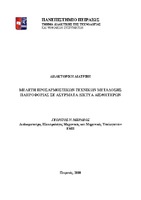Μελέτη προσαρμοστικών τεχνικών μετάδοσης πληροφορίας σε ασύρματα δίκτυα αισθητήρων

Doctoral Thesis
Συγγραφέας
Μπράβος, Γεώργιος Ν.
Ημερομηνία
2008-10-07Προβολή/
Θεματική επικεφαλίδα
Sensor networks ; Wireless LANsΠερίληψη
Τα ασύρματα δίκτυα αισθητήρων (ΑΔA) είναι δίκτυα αποτελούμενα από μικρούς κόμβους – αισθητήρες, οι οποίοι έχουν τη δυνατότητα να επικοινωνούν μεταξύ τους ασύρματα, να λαμβάνουν από το περιβάλλον διάφορα είδη δεδομένων και να τα μεταδίδουν στο υπόλοιπο δίκτυο. Το είδος των μεταδιδόμενων πληροφοριών εξαρτάται από το είδος του αισθητήρα που είναι ενσωματωμένος στον κόμβο – πομποδέκτη. Στα πλαίσια της παρούσας διατριβής πραγματοποιήθηκε μελέτη τεχνικών μετάδοσης πληροφορίας σε ασύρματα δίκτυα αισθητήρων. Οι προτεινόμενες τεχνικές αφορούν στο Φυσικό Στρώμα και στο Στρώμα Διασύνδεσης Δεδομένων, με κάποιες αναφορές στο Στρώμα Δικτύου. Για την πραγματοποίηση της μελέτης αυτής, σε πρώτη φάση κρίθηκε απαραίτητη η ανάπτυξη συγκεκριμένων μοντέλων που σχετίζονται με την τοπολογία των δικτύων, το δίαυλο επικοινωνίας, τη μέτρηση της καταναλισκόμενης ενέργειας, και την προσομοίωση των προτεινόμενων τεχνικών. Κατά συνέπεια, μελετήθηκαν και αναπτύχθηκαν ακριβή μοντέλα, τα οποία στη συνέχεια χρησιμοποιήθηκαν στο σύνολο της εργασίας για την σχεδίαση και εκτίμηση της απόδοσης ποικίλων τεχνικών μετάδοσης πληροφορίας σε ΑΔΑ. Εν συνεχεία, δόθηκε ιδιαίτερη έμφαση στην εφαρμογή προσαρμοστικών τεχνικών. Με βάση τα παραπάνω, αναπτύχθηκε ένας συνδυαστικός αλγόριθμος δρομολόγησης – δυναμικής προσαρμογής εκπεμπόμενης ισχύος. Το όνομα του προτεινόμενου αλγορίθμου είναι Energy – DElay Minimization (EDEM), και τα αποτελέσματα από την υλοποίησή του έδειξαν ότι μπορεί να συμβάλλει αποφασιστικά στην μείωση της ενέργειας που απαιτείται για τη μετάδοση δεδομένης ποσότητας πληροφορίας, αυξάνοντας κατ’ αυτόν τον τρόπο τη διάρκεια ζωής ενός ΑΔΑ. Στα πλαίσια της συνεχούς προσπάθειας για περαιτέρω βελτίωση της απόδοσης σε ένα ΑΔΑ, μελετήθηκαν εκτός από παραδοσιακές τεχνικές, και εναλλακτικοί τρόποι που αφορούν στη μετάδοση της πληροφορίας.


